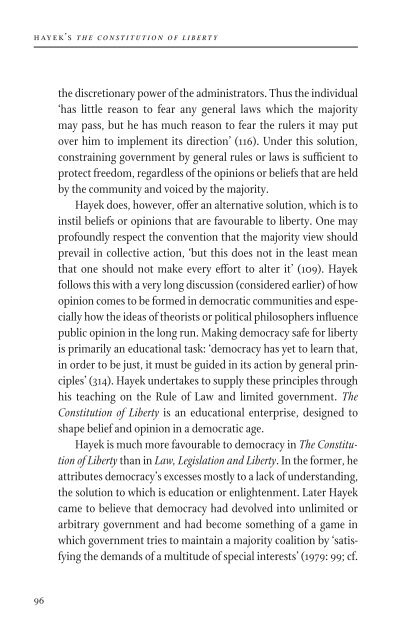Hayek's The Constitution of Liberty - Institute of Economic Affairs
Hayek's The Constitution of Liberty - Institute of Economic Affairs
Hayek's The Constitution of Liberty - Institute of Economic Affairs
You also want an ePaper? Increase the reach of your titles
YUMPU automatically turns print PDFs into web optimized ePapers that Google loves.
h ay e k ’ s t h e c o n s t i t u t i o n o f l i b e r t y<br />
m a j o r i t y r u l e a n d l i m i t e d g o v e r n m e n t<br />
the discretionary power <strong>of</strong> the administrators. Thus the individual<br />
‘has little reason to fear any general laws which the majority<br />
may pass, but he has much reason to fear the rulers it may put<br />
over him to implement its direction’ (116). Under this solution,<br />
constraining government by general rules or laws is sufficient to<br />
protect freedom, regardless <strong>of</strong> the opinions or beliefs that are held<br />
by the community and voiced by the majority.<br />
Hayek does, however, <strong>of</strong>fer an alternative solution, which is to<br />
instil beliefs or opinions that are favourable to liberty. One may<br />
pr<strong>of</strong>oundly respect the convention that the majority view should<br />
prevail in collective action, ‘but this does not in the least mean<br />
that one should not make every effort to alter it’ (109). Hayek<br />
follows this with a very long discussion (considered earlier) <strong>of</strong> how<br />
opinion comes to be formed in democratic communities and especially<br />
how the ideas <strong>of</strong> theorists or political philosophers influence<br />
public opinion in the long run. Making democracy safe for liberty<br />
is primarily an educational task: ‘democracy has yet to learn that,<br />
in order to be just, it must be guided in its action by general principles’<br />
(314). Hayek undertakes to supply these principles through<br />
his teaching on the Rule <strong>of</strong> Law and limited government. <strong>The</strong><br />
<strong>Constitution</strong> <strong>of</strong> <strong>Liberty</strong> is an educational enterprise, designed to<br />
shape belief and opinion in a democratic age.<br />
Hayek is much more favourable to democracy in <strong>The</strong> <strong>Constitution</strong><br />
<strong>of</strong> <strong>Liberty</strong> than in Law, Legislation and <strong>Liberty</strong>. In the former, he<br />
attributes democracy’s excesses mostly to a lack <strong>of</strong> understanding,<br />
the solution to which is education or enlightenment. Later Hayek<br />
came to believe that democracy had devolved into unlimited or<br />
arbitrary government and had become something <strong>of</strong> a game in<br />
which government tries to maintain a majority coalition by ‘satisfying<br />
the demands <strong>of</strong> a multitude <strong>of</strong> special interests’ (1979: 99; cf.<br />
98–104). This leads him to develop institutional means <strong>of</strong> limiting<br />
majority rule, which he incorporates into a model constitution<br />
(ibid.: 105–27).<br />
96<br />
97












